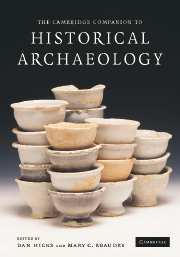Book contents
- Frontmatter
- Dedication
- Contents
- List of figures
- List of tables
- List of contributors
- Acknowledgements
- List of abbreviations
- 1 Introduction: the place of historical archaeology
- PART I ARCHAEOLOGY AND HISTORY
- PART II KEY THEMES IN HISTORICAL ARCHAEOLOGY
- PART III HISTORICAL ARCHAEOLOGY AND MATERIAL CULTURE
- PART IV HISTORICAL ARCHAEOLOGY AND LANDSCAPES
- PART V HISTORICAL ARCHAEOLOGY AND BUILDINGS
- 15 Historical archaeology and buildings
- 16 Household archaeology, identities and biographies
- 17 Afterword: historical archaeology in the wider discipline
- References
- Index
17 - Afterword: historical archaeology in the wider discipline
from PART V - HISTORICAL ARCHAEOLOGY AND BUILDINGS
Published online by Cambridge University Press: 05 July 2015
- Frontmatter
- Dedication
- Contents
- List of figures
- List of tables
- List of contributors
- Acknowledgements
- List of abbreviations
- 1 Introduction: the place of historical archaeology
- PART I ARCHAEOLOGY AND HISTORY
- PART II KEY THEMES IN HISTORICAL ARCHAEOLOGY
- PART III HISTORICAL ARCHAEOLOGY AND MATERIAL CULTURE
- PART IV HISTORICAL ARCHAEOLOGY AND LANDSCAPES
- PART V HISTORICAL ARCHAEOLOGY AND BUILDINGS
- 15 Historical archaeology and buildings
- 16 Household archaeology, identities and biographies
- 17 Afterword: historical archaeology in the wider discipline
- References
- Index
Summary
No one who has read this far can be in any doubt that historical archaeology is alive and well. The individual contributions which make up this volume, as vigorous as they are varied, reflect a branch of the discipline of archaeology that is defining its scope, developing its theoretical constructs and honing its techniques. The purpose of this brief endpiece is not to review the individual contributions but to reflect on the position of historical archaeology, as it is here presented, in the broader field of archaeological studies. The viewpoint taken is unashamedly that of an archaeologist whose perspective is that history is a valuable way of studying some aspects of the most recent fragment of the archaeological record.
We need not spend too much time on definitions. Within 'historical archaeology' are nested various other kinds of archaeology: urban, colonial, industrial, maritime, each capable of subdivision; maritime, for example, embracing underwater and nautical archaeology. All are treated in the chapters above but we should not forget that there are other subsets of historical archaeology which have successfully demonstrated their value in recent years, the study of battlefields and of gardens, for example, both with their very distinctive methodologies.
In geographical scope historical archaeology covers the world but may, for convenience, be divided into three broad groupings – occidental Old World, oriental Old World and New World – each emphasising different aspects of the shared agenda. The present volume offers little on the oriental Old World, for the very good reason that the literature is inaccessible to the majority of the western audience, but it is well to remember that potentially this region, with its deep history, has an enormous amount to contribute to the general debate and must, in due course, be brought into the mainstream of the study.
In the western part of the Old World – essentially Europe, North Africa and the Near East – historical archaeology has, from the beginning, been an essential part of archaeological studies. One has only to browse through the early volumes of the British journal Archaeologia, the first volume of which was published in 1779, to appreciate the wide breadth of the study as it was, even then, practised.
- Type
- Chapter
- Information
- The Cambridge Companion to Historical Archaeology , pp. 314 - 319Publisher: Cambridge University PressPrint publication year: 2006



